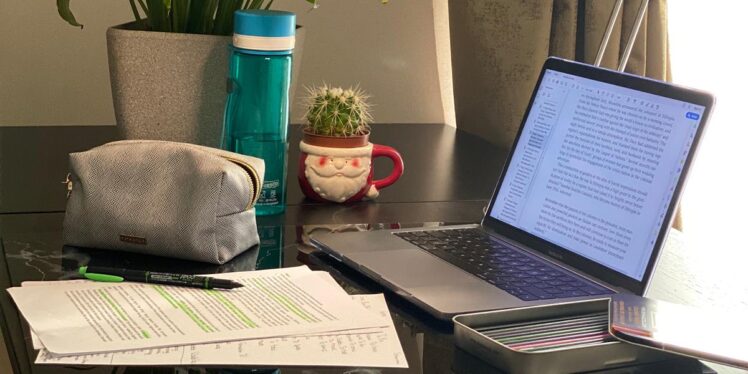Home › Education › Productivity
7 Bits of Advice on How to Boost Your Studying Productivity
Published on:
Every student has been in the situation when he was scrolling through the Instagram feed or watching his favorite blogger on YouTube instead of dealing with the university assignment or hiring the best essay writer. Nowadays, under the circumstances of the pandemic, this problem has become more pressing. It is not surprising at all. People who are confined in the dormitories/flats/houses may be distracted from tasks because they have never done them at home. In addition, many other things like television, food, bed, gaming also work as destructions. They are usually enjoyable and easy to do in comparison with tiring studying. So, how can students resist these temptations and improve their productivity?
In today’s article, we are about to provide some useful advice on how to boost your level of studying productivity.
Contents
7 pieces of advice
1. Come up with a to-do list

Make sure to create a list of things you have to deal with in the nearest future. Of course, you may say that it is quite an obvious step. However, the majority of the students neglect the importance of the to-do list. Also, do not forget to include the deadlines of the upcoming tasks and divide them into several groups based on their priority, as prioritizing is an excellent tool that can significantly improve your academic performance.
Finally, try to place this to-do list at some visible place so that every time you have the urge to procrastinate, the magic list will get your attention. For instance, the lock screen of your smartphone could be a great variant.
2. Follow a daily routine
Having a routine that you follow on a daily basis builds up consistency and powerful self-discipline. Actually, these two things are highly beneficial both for your studies as well as your personal life.
It is an extended version of the previously mentioned to-do list that concerns your day as a whole. A well-structured routine with allocated study time is surely about to increase your productivity.
3. Make sure to set clear goals

The essential step for maximizing the level of studying productivity is setting goals. This is important since if goals are vague, they are more likely to cause you to procrastinate. For example, if you want to study for the final exam, setting a vague goal such as “study for the exam” is more likely to cause you to procrastinate. Instead, try a more precise goal such as “take notes from 10 pages of study materials every day”.
Also, remember that goals should be meaningful and achievable. The crucial thing in boosting your studying productivity is finding the right rate of progress and work rhythm that suits you perfectly.
4. Practice time-management techniques
Practicing different time-management techniques can help you get started on your work and remain focused throughout the duration of your study process. One example is the Pomodoro Technique, which implies organizing your task -execution by using a timer.
The Pomodoro Technique is a time-management technique that involves working on a task for a set amount of time. Then, take a short break before coming back to work again. For example, you take notes or listen to the recorded lecture for 25 minutes, then relax for 5 minutes. You can repeat this work cycle as many times as you want to.
This technique will add some motivation and help to enter the flow state.
5. Give it some time to digest

When studying for hours straight, it is easy to get overwhelmed with new information. So a good idea is to use an essay writing service to get help with a writing assignment and allocate yourself some time to digest novice data and think about the way you are going to use it. This will allow you to avoid re-reading articles/books over and over again.
6. Switch from mental to physical activity
There is a saying that the best rest is switching from mental activity to physical and vice versa. As a matter of fact, many scientists have proven that theory, as working out has a similar effect on your as sleep does.
Exercising can help with a lack of focus while rebooting your head and clearing it from useless thoughts. So, do not be afraid of moving your body for 15 minutes between- study sessions.
7. Healthy sleep
However, all the tips mentioned above won’t bring any results unless you get from 7 to 9 hours of sleep. Little sleep can lead to drowsiness, constant tiredness, headaches. As a result, you will have hard times concentrating even on the simplest things like reading and digesting the material. And these are only half of the consequences of sleep deprivation. So, mind your sleep schedule carefully and take care of your body!
Conclusion

We hope that the tips presented here will be beneficial to skyrocket your studying productivity and achieve excellent academic results.
Remember that productivity cannot be improved without your inner wish and effort combined. If one of these things is missing, you will sabotage a whole productivity improvement process. So, before you start using these tips, think of the reasons why you need it. It may be as simple as getting a good grade or the possibility to finish university with flying colors and land a dream job.
In addition, try to start small. Never use all these tips at once. You and your brain may be overwhelmed after one overproductive day, and you will feel tired the next one. As a result, you will try to avoid any improvement on conscious and even unconscious levels. Try our productivity tips in consecutive stages. Start with the simplest ones and then go to challenging ones. Only this way will you achieve success, study and do everything you planned on time.
Share With Your Friends
